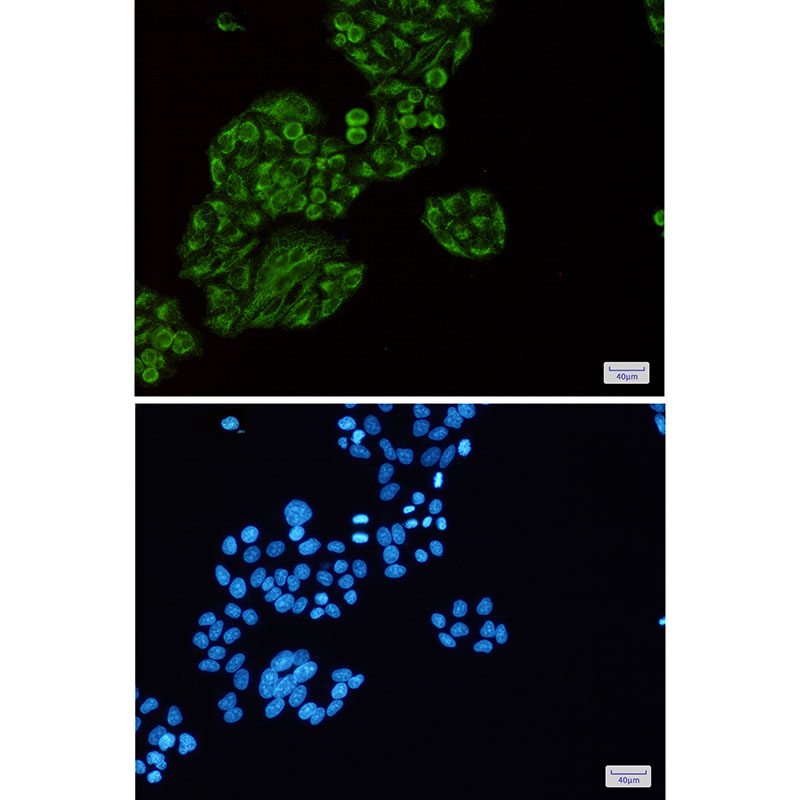

| WB | 1/500-1/1000 | Human,Mouse,Rat |
| IF | 咨询技术 | Human,Mouse,Rat |
| IHC | 咨询技术 | Human,Mouse,Rat |
| ICC | 1/50-1/200 | Human,Mouse,Rat |
| FCM | 咨询技术 | Human,Mouse,Rat |
| Elisa | 咨询技术 | Human,Mouse,Rat |
| Aliases | Tyrosine-protein kinase Tec |
| Entrez GeneID | 7006 |
| WB Predicted band size | Calculated MW: 74 kDa; Observed MW: 58-75 kDa |
| Host/Isotype | Rabbit IgG |
| Antibody Type | Primary antibody |
| Storage | Store at 4°C short term. Aliquot and store at -20°C long term. Avoid freeze/thaw cycles. |
| Species Reactivity | Human |
| Immunogen | A synthetic peptide of human Tec |
| Formulation | Purified antibody in TBS with 0.05% sodium azide,0.05%BSA and 50% glycerol. |
+ +
以下是3篇关于Tec激酶(或相关抗体应用)的文献摘要示例,供参考:
---
1. **文献名称**: *Tec family kinases in T lymphocyte development and function*
**作者**: Tomlinson, M.G. et al.
**摘要**: 该综述系统总结了Tec激酶家族(包括Itk、Rlk等)在T细胞信号传导中的作用,重点探讨其通过调控IL-2分泌和T细胞受体(TCR)信号影响免疫应答的机制,为开发靶向Tec激酶的抗体或抑制剂提供理论依据。
---
2. **文献名称**: *Targeting the Tec kinase family in autoimmune disease*
**作者**: Mina-Osorio, P. et al.
**摘要**: 研究通过动物模型证明Tec激酶抑制剂(如使用单克隆抗体阻断Btk)可显著减轻类风湿性关节炎和狼疮的炎症反应,提示靶向Tec家族激酶的抗体疗法在自身免疫疾病中的治疗潜力。
---
3. **文献名称**: *Btk-specific antibody blocks B-cell receptor-mediated signaling in lymphoma cells*
**作者**: Honigberg, L.A. et al.
**摘要**: 该研究开发了一种特异性靶向Bruton酪氨酸激酶(Btk,Tec家族成员)的单克隆抗体,实验显示其能有效抑制B细胞淋巴瘤的增殖和存活,为B细胞恶性肿瘤的抗体治疗提供新策略。
---
4. **文献名称**: *Role of Tec kinase in cancer progression and drug resistance*
**作者**: Guo, W. et al.
**摘要**: 本文发现Tec激酶在前列腺癌中通过PI3K/AKT通路促进肿瘤转移,使用特异性抗体抑制Tec活性可增强化疗敏感性,提示其作为癌症联合治疗靶点的价值。
---
**注**:以上文献为示例性质,实际引用时建议通过PubMed或Google Scholar检索最新研究。若需具体文献的DOI或发表年份,可进一步补充信息。
Tec family kinases are a group of non-receptor tyrosine kinases critical in intracellular signaling, particularly in immune and hematopoietic cells. Discovered in the 1990s, the Tec family includes five members: BTK (Bruton's tyrosine kinase), ITK (IL-2-inducible T-cell kinase), TEC, TXK (RLK), and BMX. These kinases share a unique structural organization, featuring a pleckstrin homology (PH) domain for membrane localization, a Tec homology (TH) domain with proline-rich and zinc-binding regions, and a catalytic kinase domain.
Tec kinases are activated by diverse stimuli, including antigen receptors, cytokine receptors, and integrins. BTK, the most studied member, is essential for B-cell development and activation, linking B-cell receptor (BCR) engagement to downstream pathways like NF-κB and MAPK. Mutations in BTK cause X-linked agammaglobulinemia (XLA), a primary immunodeficiency. Similarly, ITK regulates T-cell receptor signaling, influencing T-cell proliferation and cytokine production.
Dysregulation of Tec kinases is implicated in autoimmune diseases, allergies, and cancers. BTK inhibitors (e.g., ibrutinib) have revolutionized treatment for B-cell malignancies like chronic lymphocytic leukemia. Emerging research explores targeting other Tec kinases (e.g., ITK in asthma, TEC in platelet disorders) for therapeutic intervention. Their dual roles in immune regulation and oncogenesis make Tec kinases pivotal in both basic research and clinical translation.
×